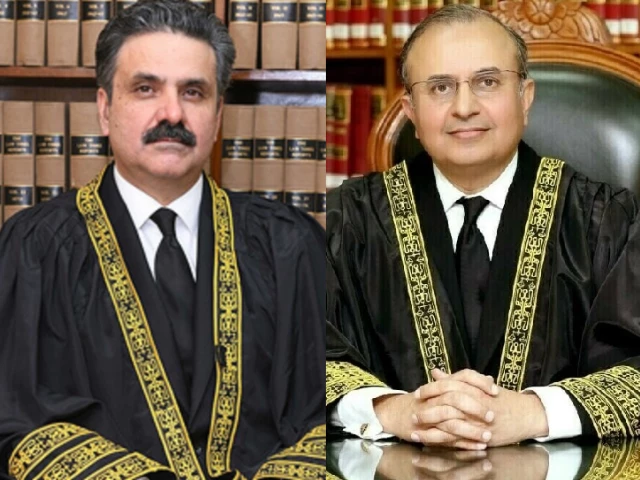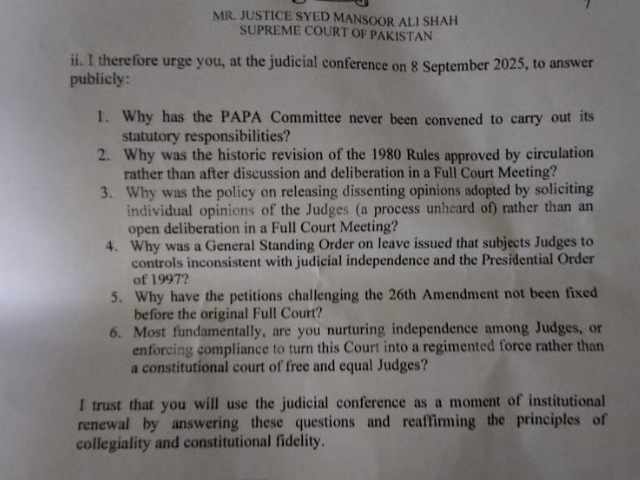‘Why petitions against 26th Amendment not fixed before full court,’ Justice Mansoor asks CJP
In a letter written to CJ Yahya Afridi, senior puisne judge asks six institutional questions

Supreme Court's senior puisne judge, Justice Syed Mansoor Ali Shah, has written a letter to Chief Justice Yahya Afridi, urging him to publicly respond to a series of pressing institutional questions at the upcoming judicial conference on September 8, 2025.
The letter, titled “Pressing Institutional Concerns”, spans seven pages, raised serious concerns about transparency, judicial independence, collegiality, and the internal functioning of the apex court.
Justice Mansoor emphasizes that the issues he highlights are not personal grievances, but stem from a "deep commitment to the judicial work" and the integrity of the institution. “As the senior-most Judge of this Court after yourself, I write this letter with reluctance, but in discharge of an unavoidable institutional duty,” wrote Justice Mansoor.
Justice Mansoor listed six specific questions for Chief Justice Afridi to answer publicly at the judicial conference, focusing on the unconvening of the PAPA Committee, the revision of the 1980 Rules without a full court debate, the issuance of the General Standing Order on leave, the failure to fix petitions challenging the 26th Amendment before the original full court, and the overall independence of the judiciary.

Among the core issues, Justice Mansoor highlighted that judicial rosters and bench formations have been issued unilaterally, bypassing mandatory consultation.
Justice Mansoor pointed out that his repeated letters and written communications to the Chief Justice on the issues had gone unanswered, adding, “Such silence from the Chief Justice to the senior-most Judge of the Court is not merely discourteous; it undermines the collegial traditions of this Court.”
He also criticized the recent revision of the Supreme Court Rules, 1980, stating that it was passed through circulation rather than a full court meeting—an act he deemed a "lack of collegiality and preference for unilateral authority."
Justice Mansoor took issue with the policy of soliciting dissenting opinions via written communication, calling it a "tick-box exercise" that deprived the Court of rich deliberation. He further condemned the General Standing Order (GSO) on Leave issued in July 2025, which classifies judges as "whole-time" functionaries of the state.
“Judges are not regimented officers; their independence is constitutionally entrenched,” he stated.
He termed the GSO’s requirements—such as disclosing a judge’s residential address and limiting leave categories—as “surveillance” that undermines the dignity and independence of the judiciary.
Perhaps the most serious charge comes in the section on the legitimacy of the Court itself, where Justice Mansoor questioned why petitions challenging the 26th Constitutional Amendment—which affect the very independence of the judiciary—have remained unheard for nearly a year.
“True leadership lies not in managing compliance but in ensuring that the Court rises above suspicion as the fearless guardian of the Constitution,” he wrote.
The letter marks one of the most open and institutional confrontations in the recent history of Pakistan’s Supreme Court. Its tone, content, and the call for public accountability reflect growing discontent within the judiciary over the centralization of administrative powers under the Chief Justice.
Justice Mansoor ended the letter by urging the Chief Justice to use the judicial conference as “a moment of institutional renewal,” and to reaffirm “the principles of collegiality and constitutional fidelity.”



















COMMENTS
Comments are moderated and generally will be posted if they are on-topic and not abusive.
For more information, please see our Comments FAQ